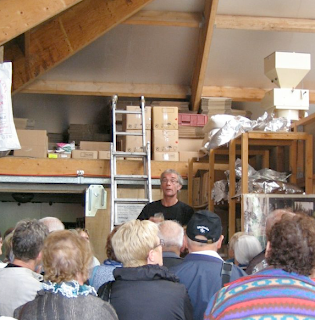The Brasserie Thiriez (pronounced "teary-yay") is located in the tiny French farmland village of Esquelbecq, very near the border of Belgium. This part of France hosts countless tiny villages of old stone buildings surrounded by lush, verdant rolling hills -- endless undulating green fields, interrupted by narrow winding roads, wire fencing, the occasional stand of trees -- dotted with large swaths of bright yellow patches of rapeseed. Many a field is populated by cows, sheep and occasionally some pigs. You don't see many people, however.
After a career as a human resources executive at a large French supermarket chain, Daniel Thiriez decided, like many homebrewers before him, to take his love of making and enjoying beer to the professional level. The location of his brewery, which he founded in 1996, had long been the farmhouse brewery of a local family farm, which had operated up until 1945.
 |
| Downtown Esquelbecq. |
 |
| The brewery barn, with hop garden in front. |
 |
| AKA Thiriez Extra. |
Here is B.R.'s summary translation of the address Daniel made to his brewery guests in our podcast this installment:
He starts by saying that the brewery has been around for 16 years, since 1996. The region has a long history of brewing and the current tasting room used to be the farm's brewery up until 1945. The town has about 2,000 inhabitants and, at one point in history, it used to be home to 5 different breweries. There were also 84 cafés and "estaminets" (pubs) for those 2,000 people... The next town over had 8 breweries. At the time, beer was pretty much the only beverage because wine was reserved for special occasions in that region and the water wasn't necessarily safe to drink.
Eventually, all of the small village breweries closed throughout the 60s into the 80s -- even the regional breweries closed. Now, there's been a revival and most "départements" in France have at least one brewery.
Daniel states that he brews 2,000 liters on a typical brew-day. He then goes on to talk about the ingredients that go into his beer. The water is filtered, softened, and dechlorinated. He uses local malt. He then describes the malting process. His beers are 100% malt (he actually mention this, but a lot of beers from the north of France have added sugar, usually in the form of barley syrup).
Then he explains the brewing process: mash in, sparging, boil (1 1/2 hour), hops. The region used to be a big hop growing area, but not as much now. Since the local hop selection is limited, he also buys varieties from Alsace, Germany, England, Czech, Belgium, and the U.S.
He shows the group whole hop flowers and pellets, passing around jars filled with the various permutations of hops. Daniel mentions that other botanticals or spices can be added if the brewer so chooses, as a general statement -- not specifically referring to his own beers.
The chilling and fermentation steps are spoken of before he talks about yeast. The brewery has been using the same strain (from a lab in Brussels) since the start. Fermentation takes one week, and then he has a three week period of "de garde", or conditioning. All of the beers are unfiltered.
Daniel points to the bottling machine and says that it can fill 1,000 bottles per hour. The beers are refermented in the bottle, and it takes at least two weeks for them to reach proper carbonation. He then discusses the yeast deposits in the bottles -- sur lies.
Mr. T then talks about his different beers. Someone asks a question about organic beer and he says that he does have one organic beer (La biObière) but says that there are not a lot of organic hops available, so the choice is limited. He says that most of his sales are local, but he does export about 10% of his beer to the US, Canada, Sweden, and Japan. His main goal, however, is to remain a local producer. He's got three full-time workers (including himself).
A tour group member asks, what is the difference between Kronenbourg and similar mass-produced beers, and the Thiriez beers. He then goes into a brief description about ales and lagers and artisanal beers that are meant to be savored, and industrial beers that are mainly just thirst-quenchers. He then invites everyone to walk around the brewery but not to turn any knobs or faucets, "even if you're thirsty". Then it's off to the tasting room for some sampling!
Note: many of the pictures in the post come courtesy of Ryan of Shelton Bros., who accompanied us on this part of our trip, and we thank him for his contribution. The other photos were by B.R.
 |
| A view of the cafe building from the brewery drive. |
 |
| The entrance to the cafe/tasting room. |
 |
| The kettle à gauche, mashing tun à droit. |
 |
| Bottling line. |
 |
| Daniel addresses the tour group. |

 |
| The bar of the cafe. |
 |
| Poser. |
 |
| Senior beer day! |
 |
| VERY local hops. |
 |
| Looking from the bed & breakfast to the cafe on the left, brewery set back on the right. |











No comments:
Post a Comment